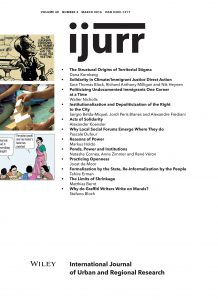Foucauldian Approach to Autism?
by bmckernan
 A recent article in Newsweek on new scientific advancements in understanding autism provides a seemingly Foucauldian account on the event. The story is reporting on breaking news from the medical community that scientists have identified human gene variants that may account for up to 15% of all autism cases. If true, scientists may be able to develop prenatal tests to identify cases of autism and thus intervene much earlier to help those suffering from the disease. However, rather than detail the specifics of this potential medical breakthrough, the article in Newsweek instead focuses on the reaction to this news by Ari Ne’eman, a “neurodiversity” activist diagnosed with Asperger Syndrome.
A recent article in Newsweek on new scientific advancements in understanding autism provides a seemingly Foucauldian account on the event. The story is reporting on breaking news from the medical community that scientists have identified human gene variants that may account for up to 15% of all autism cases. If true, scientists may be able to develop prenatal tests to identify cases of autism and thus intervene much earlier to help those suffering from the disease. However, rather than detail the specifics of this potential medical breakthrough, the article in Newsweek instead focuses on the reaction to this news by Ari Ne’eman, a “neurodiversity” activist diagnosed with Asperger Syndrome.
As the article explains, Ari and the organizations he represents are advocating for a change in contemporary America’s understanding of autism. Rather than view autism as a tragic medical disease, these groups instead insist that America should embrace “neurodiversity” rather than attempt to eliminate it. In the Newsweek article, Ari expresses concern over medical progress in identifying genes linked to autism. Ari’s apprehension is based on his belief that if such a genetic test can be developed, it will be used to either prenatally cure autism or to “eugenically eliminate” those allegedly suffering from autism.
In many ways, the account offered in the Newsweek article reflects some of Foucault’s major insights into the normalizing effects of medical/psychological discourses in the contemporary world. As Foucault documents in such works as Madness and Civilization and Discipline and Punishment, while the medical sciences may have the most progressive of intentions at heart, they also actively cater to particular power dynamics, producing discourses that result in the privileging or naturalizing of certain social behaviors and identities at the expense of others. Much of Foucault’s work examines how these discourses ultimately legitimate the institutional control over allegedly “sick” members of society.
From the Newsweek article’s account, it seems that in many ways Ari Ne’eman is providing a Foucauldian understanding to autism. By advocating for the recognition of neurodiversity, Ari and his associates are essentially arguing that by viewing autism as a tragic disease in need of curing rather than a “different way of being,” America is privileging or normalizing one type of social behavior or identity at the expense of others. The medical institution plays an essential role in this narrative, legitimizing this normalizing process by providing medical knowledge in support of the social distinction between those considered healthy or normal and those allegedly suffering from autism.
Just as Ari’s comments should not be treated as reflective of the thoughts of all those diagnosed with autism, certainly a Foucauldian approach is not the only way in which this debate can be sociologically examined. However, the potential insights that can be gained from applying a Foucauldian approach to the current debate over autism certainly serves as a testament to the powerful insight Foucault’s approach still offers scholars to this day.
![]() Newsweek article on Ari Ne’eman
Newsweek article on Ari Ne’eman
















1540-6210/asset/society_affiliation_image.gif?v=1&s=812a48e1b22880cc84f94f210b57b44da3ec16f9)
I am very curious about what can be learned from genes. As autism is a spectrum condition, can the gene indicate the severity of the condition? If not, what are the potential costs of treating autism prior to knowledge about the nature of the condition? Thanks for an interesting post on health, technology, and conceptions of diversity!
Keri